House oks $15 minimum wage, setting marker for 2020 campaign
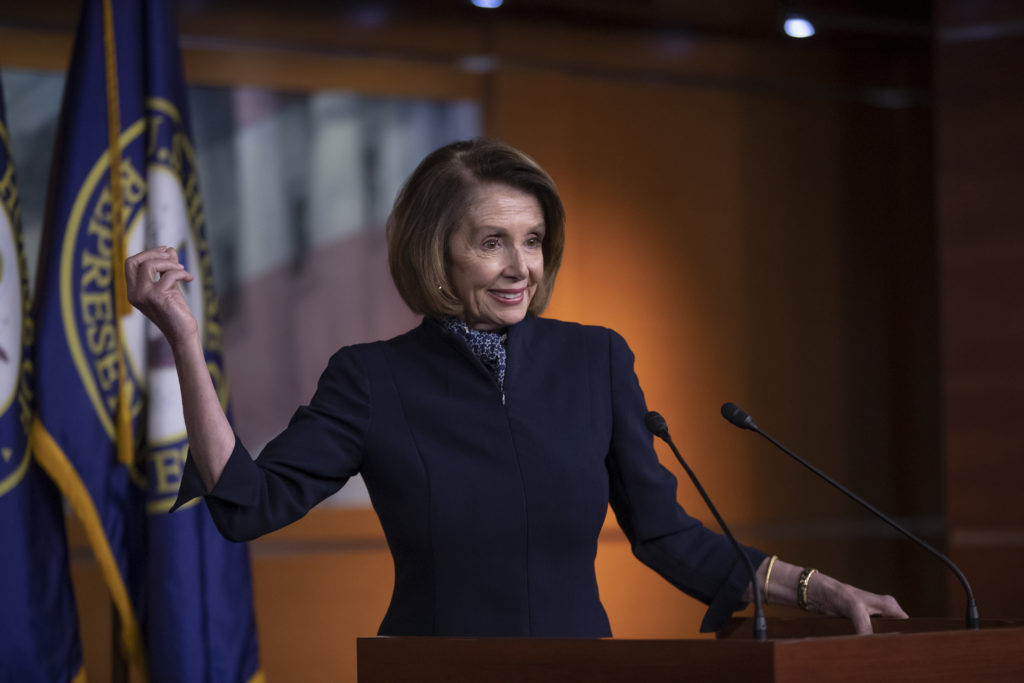
House Democrats approved legislation Thursday to raise the federal minimum wage for the first time in a decade, to $15 an hour, transforming an issue that once splintered the party into a benchmark for the 2020 election. Even though the bill has little chance of passing the Republican-led Senate, or being signed into law by President Donald Trump, the outcome pushes the phased-in rate to the forefront as the new standard, one already in place at some leading U.S. corporations. While the increase would boost pay for some 30 million low-wage workers, intended as one answer to income inequality, passage was assured only after centrist Democrats won adjustments to the bill. Reluctant to embrace the party’s left flank, they pushed for changes, including a slower six-year phase-in of the wage. It’s a reminder of moderates’ influence on policy, but also the limits. “We’re testing candidates from the presidential all the way down to the school board,” said Mary Kay Henry, the president of the Service Employees International Union whose members cheered passage from the House gallery. To address stark income inequality, she said, “they have to raise wages.” A hike in the $7.25 hourly wage has been a top Democratic campaign promise, and what Majority Leader Steny Hoyer of Maryland called Thursday the “right thing to do.” “America’s workers deserve a raise,” said Speaker Nancy Pelosi at a press conference with labor leaders and employees ahead of voting. Lifting a young girl into her arms, Pelosi said, “This is what it’s all about… It’s about family.” The last increase in the federal minimum occurred 10 years ago, the longest stretch without an adjustment since the wage floor was first enacted during the 1930s. The wage protection covers millions of low-wage workers in all types of jobs. Under the House bill, for the first time, tipped workers would be required to be paid the same as others earning the minimum, boosting their pay to $15 an hour, too. It’s now $2.13, in what labor scholars call a jarring remnant from the legacy of slavery, when newly freed workers received only tips. Republicans in the House balked at the wage hike, which would be the first since Democrats last controlled the majority. Just three Republicans joined most Democrats in passage, on a 231-199 vote. During the floor debate, Rep. Ronald Wright, Republican-Texas, called it a “disastrous bill.” Republicans have long maintained that states and municipalities are already able to raise the wage beyond the federal minimum, and many have done so. They warn higher wages will cost jobs, especially among smaller business owners. Wright said the bill should be renamed the “Raising Unemployment for American Workers Act.” While opponents have long said higher minimum wages lead to job losses, economists say new studies are casting doubt on those long-held theories. A report from the nonpartisan Congressional Budget Office sent mixed messages. It said more than 30 million workers would see bigger paychecks with a higher wage, lifting more than 1 million workers from poverty. It also said between 1 million and 3 million jobs could be lost. At time of wage stagnation and grave income inequality that’s playing out on the campaign trail, Democrats led by Rep. Bobby Scott, Democrat-Virginia, the chairman of the House Education and Labor Committee, are willing to accept that tradeoff. But swift passage earlier this year ran into trouble when centrists and those Democrats from rural regions and Southern states raised concerns. While the new Democratic majority is often seen as pushing the House leftward, many of the freshmen are actually moderates from districts won by Trump in 2016. Those same freshmen will face some of the toughest reelection races in 2020. The moderate Blue Dog Coalition, led by Rep. Stephanie Murphy, Democrat-Florida, advocated for changes to the wage bill. With some two dozen members, the caucus has enough votes to deny Pelosi a majority and sink the legislation. They wanted the longer phase of six years instead of five. And they included an amendment requiring a report from the General Accountability Office, after the first phases of the wage hike, to assess the economic impact on jobs and whether wages should be fully raised to $15. “I’ve always been one to believe compromise is not a dirty word,” Murphy said in an interview. “It has helped us get things done.” Most members of the Blue Dogs and another centrist caucus, the New Democratic Coalition, ended up voting for the bill. They also held the line against a Republican alternative. Progressives and labor leaders said they could live with the changes. Rep. Mark Pocan, Democratic-Wisconsin, co-chairman of the Congressional Progressive Caucus, said the bill is popular back home and far from Trump’s characterization of Democrats as “socialists.” The idea of a $15 hourly wage, “somehow that’s an out-of-the-mainstream thought?” he said. “Of course not.” Advocates who have been trying to boost wages for workers for years said they were stunned at how quickly the debate shifted. Sara Jayaraman, president of the Restaurant Opportunities Center United, group founded with displaced workers from the World Trade Center after the Sept. 11, 2001 terror attacks, said boosting the tipped wages in particular, for waiters and other tipped workers, was a milestone. It’s “historic moment and a historic bill,” she said. “Once you start raising workers’ wages it’s hard to go back.” By Lisa Mascaro AP Congressional Correspondent. Follow Mascaro at https://twitter.com/@lisamascaro. Republished with permission of the Associated Press.
Ballot initiatives buck legislatures in GOP-leaning states
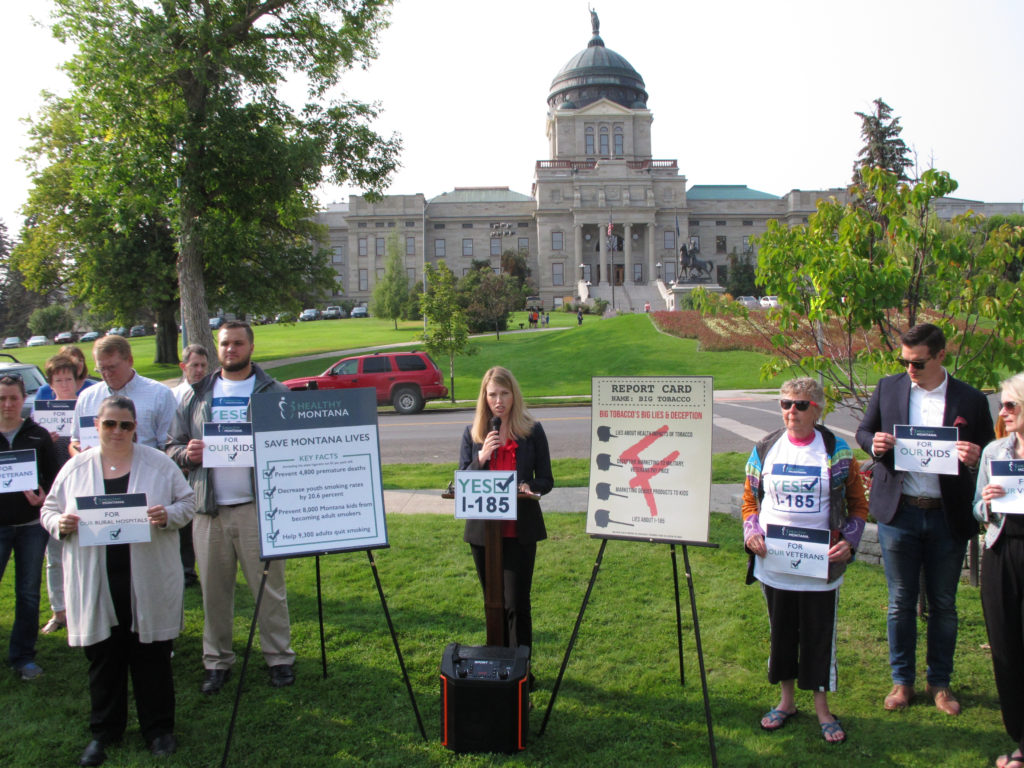
Marijuana legalization. An increase in the minimum wage. Expansion of Medicaid. Come Election Day, voters in a batch of Republican-dominated states will weigh in on these and other liberal or centrist proposals that reached the ballot after bypassing state legislatures. Pushed forward via signature-gathering campaigns, these measures offer a chance for voters to do things their GOP-run legislatures oppose. Many are considered to have a good chance of passage. In four of the states — Florida, Missouri, Montana and North Dakota — the ballot measures might have some effect on closely contested U.S. Senate races. Even a slight boost in turnout among liberal-leaning voters could help Bill Nelson, Claire McCaskill, Jon Tester and Heidi Heitkamp, the endangered Democratic incumbents in those states. Missouri is notable this year for having three left-leaning proposals on its ballot — raising the minimum wage, legalizing marijuana for medical purposes and changing the congressional redistricting process so that it is potentially less partisan. The minimum-wage measure might have special appeal to low-income voters from Kansas City and St. Louis, where efforts to raise pay locally were thwarted by the Legislature last year. Among those dismayed by the Legislature’s move was the Rev. Starsky Wilson, who heads a social services foundation in St. Louis. He also co-chaired a commission that investigated economic and social inequality after the racial unrest provoked by the 2014 killing of Michael Brown by a police officer in Ferguson. “When the Legislature pre-empted, it showed what lengths folks will go to thwart the will of the people,” Wilson said. “These were unfortunate actions of some legislators who don’t seem to care about the poor and also don’t seem to care about democracy.” Most of the financing for the minimum wage campaign has come from a Washington-based liberal organization, the Sixteen Thirty Fund, which has backed campaigns in other states. The wage increase is opposed by Associated Industries of Missouri and the Missouri Chamber of Commerce and Industry, which say it will raise the cost of doing business and possibly reduce the number of entry-level jobs. However, more than 350 Missouri businesses have announced support for the increase. The measure would gradually raise the state’s $7.85 minimum wage to $12 an hour, starting with a boost to $8.60 in January. St. Louis Mayor Lyda Krewson said that the current wage is not high enough and that even the bump in January might not do much for many minimum-wage workers. “But it’s a move in the right direction,” she said. St. Louis had raised its minimum to $10 an hour before the legislature banned local governments from setting wages that were higher than the state’s. Dave Robertson, a political science professor at the University of Missouri-St. Louis, said the ballot measures might have only a marginal effect on turnout. “That said, the marginal votes could make a huge difference in the Senate race because everyone expects it to be dead even,” he said, referring to McCaskill’s effort to repel a strong challenge from Republican Attorney General Josh Hawley. Aside from Missouri, other GOP-controlled states with liberal- or centrist-backed measures on the ballot include: Arkansas, to raise the state minimum wage from $8.50 an hour to $11 by 2021. Idaho, Nebraska and Utah, to expand Medicaid coverage to more residents. Montana, to raise tobacco taxes to extend an existing Medicaid expansion. North Dakota and Michigan, to legalize recreational use of marijuana, a step already taken by nine other states. Utah, to legalize medical use of marijuana. Michigan and Utah, to change the redistricting process, an issue also on the ballot in swing-state Colorado. Florida, to restore the right to vote for most people with felony convictions upon completion of their sentences. The proposed constitutional amendment needs the support of 60 percent of voters to prevail; if that happens, an estimated 1.4 million Floridians could regain the right to vote. The Democrats in Florida’s two highest-profile election contests support the amendment — gubernatorial candidate Andrew Gillum and Bill Nelson, who is seeking a fourth term in the U.S. Senate. Nelson’s GOP opponent, Gov. Rick Scott, opposes the amendment, as does Ron DeSantis, the Republican seeking to succeed Scott as governor. Daniel Smith, a University of Florida political science professor, said public support for the amendment appears to be strong, possibly providing a modest boost to Gillum and Nelson. “It’s not going to help the Republicans at all,” Smith said. “Will it help the Democrats? It could, at the margins.” The partisan pattern is reversed in two Democratic-leaning states, Oregon and Massachusetts, where conservatives are using the initiative process in a bid to overturn existing state policy. The target in Massachusetts is a 2016 law extending nondiscrimination protections to transgender people in their use of public accommodations. Conservatives in Oregon are targeting two policies — one that allows use of state funds to pay for low-income women’s abortions, the other forbidding law enforcement agencies from using state resources or personnel to arrest people whose only crime is being in the U.S. illegally. Craig Burnett, a political science professor at Hofstra University, views the initiative process as a valuable tool for citizens disenchanted with their legislature. “If it’s legislating much too far from where the people are in any direction — conservative or liberal — the initiative is one way to move it back to where the people are,” he said. In all, there will be 157 measures on the Nov. 6 ballot in 37 states. As usual, most of the measures were placed on the ballot by state legislatures; there are 65 measures resulting from citizen campaigns. In some states, initiatives have met with strong resistance, either from the legislature or powerful interest groups. In Arizona, after a six-day strike by tens of thousands of teachers, they and their allies gathered enough signatures to place a measure on the ballot that would boost school funding by raising taxes on the wealthy. The Arizona Supreme Court blocked the initiative after the state’s Chamber of Commerce and others
Angelo Amador: Alabama’s minimum wage decision is aimed at the future, not the past

At a time when Alabama’s unemployment rate is at an all-time low and world-class companies are selecting the state to lay down roots, Alabama is making headlines for entirely different reasons. Articles in The New York Times and The Wall Street Journal have weighed in on the statewide minimum wage law. The hook in the mouth of the media was the recent decision by a panel of the Eleventh Circuit Court of Appeals to reinstate a lawsuit that could allow the City of Birmingham to set its own minimum wage. The panel in the case cited Alabama’s “racial history” to question legislators’ motives in standardizing a statewide minimum wage in 2016. A request for review to the full Eleventh Circuit Court of Appeals is pending. This has led some pundits to misconstrue the issue. Take for example the NYT op-ed by Lucas Guttentag, which maligns “predominantly Southern and border states” for preventing localities from raising their minimum wage. Such guilt by regional association is not only a meaningless ad hominem argument, the characterization itself isn’t true. Today 25 states—half the country—have enacted uniform minimum wage laws. Even if we allow Pennsylvania, Michigan, and Idaho to count as “border states” with Canada, how do Utah, Iowa, Rhode Island, and Oregon fit the suggested mold? The fact is there are good reasons to oppose local minimum wage ordinances. For one thing, there is a dearth of evidence that such hikes combat poverty. To the contrary, rising labor costs tend to have unintended consequences for the same workers they are meant to help. Hiring slows, benefits are cut, and fewer hours are offered to employees. When passed only locally, a move of one or two miles can take a business outside the new wage jurisdiction, resulting in widespread business flight. Workers generally don’t see better paychecks, but all local consumers lose to inflation, particularly in food prices. Sadly, where there are more low-wage workers, minimum wage-sparked price increases are both larger and more rapid. This isn’t just economic theory. Seattle, a major city that recently passed a substantial minimum wage increase, has encountered significant problems. A University of Washington study found no windfall for workers. Instead, pay increases were offset by reductions in employment and hours. Precisely such reasoning led Catherine Pugh, the African-American mayor of Baltimore, to veto a minimum wage ordinance for that city made up of a majority African-American population. She concluded it would be low-income workers who suffered most as jobs and tax revenue departed. Far from acting with some form of antiquated racial animus, the Alabama Legislature chose to protect the state from future economic harm. Without a uniform minimum wage law, we could have seen passage of over 500 different local ordinances. This would add devastating levels of complexity to business operations and suppress economic growth in the state. As Alabama’s second largest employer, the restaurant and foodservice industry supports the State of Alabama’s stance and plans to join representatives from other job creators in the state in asking the full Eleventh Circuit Court of Appeals to review the panel’s decision. While a patchwork of local minimum wage laws would be a disservice to our employees and communities, the rising tide of the state’s economy is steadily bringing greater prosperity to all. ••• Angelo Amador is Executive Director of the Restaurant Law Center, which supports the Alabama Uniform Minimum Wage and Right to Work Act. This bill blocks cities from setting individual minimum wage rules. The Restaurant Law Center is a 501(c)(6) legal entity affiliated with, but separate from, the National Restaurant Association. The Center’s goal is to promote pro-business laws and regulations that allow restaurants to continue growing, creating jobs and contributing to a robust American economy.
Charter Communications ups minimum wage to $15 an hour, credits tax law
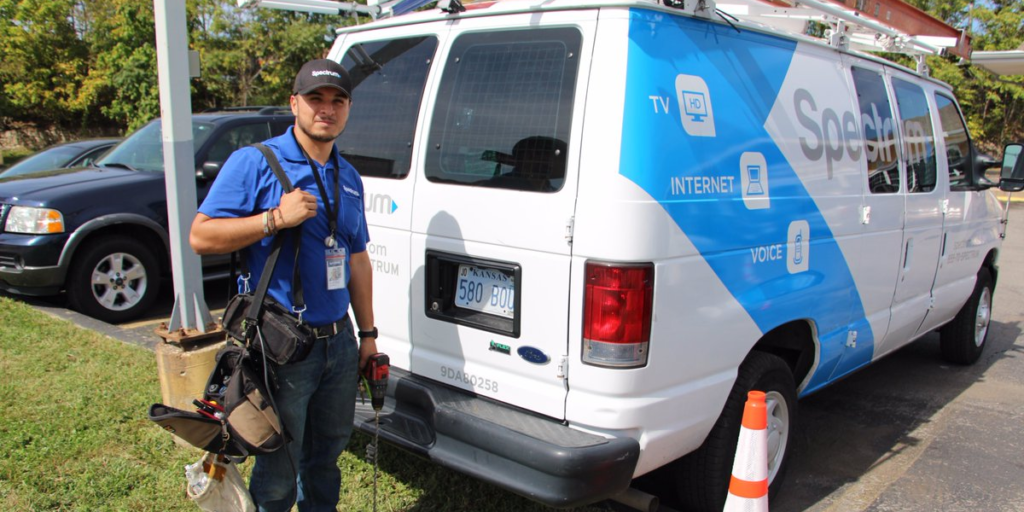
The telecom giant Charter Communications is raising the minimum wage to $15 per hour, the company announced in a blog post Friday. Charter’s 95,000 employees will see the increase by the end of the year confirmed CEO Tom Rutledge. The company cited President Donald Trump‘s historic tax reform legislation — which reduced the corporate tax rate from 35 percent to 21 percent — and the Federal Communications Commission’s December repeal of net neutrality rules as major reasons for increasing compensation. “With the resources and investment confidence resulting from historic tax reform legislation and the FCC’s removal of the 1930’s era regulatory framework for internet service, Charter is increasing our investment in our workforce,” Rutledge said. “Raising our minimum wage is the right thing to do for our employees and our company. The majority of our employees are call center representatives, field technicians and staff at Spectrum stores,” Rutledge continued. “Our commitment to pay every employee at least a $15 per hour income will enhance our efforts to develop our highly-skilled, diverse and locally based workforce, improving their lives and the lives of the customers they serve.” Most of Charter’s approximately employees are call center representatives, field technicians and store staff. They are the face of Charter some 26 million customers across 41-states. Charter also plans to hire more than 20,000 employees by 2020 and the minimum wage increase will “enable [Charter] to better attract, train and retain the highly skilled, diverse workforce we want and need to solve [their] customers’ problems or install cable broadband service in their homes.” Charter also reiterated its plan to invest $25 billion in infrastructure. The company said it is continuing to expand its broadband network, which includes trying to reach more rural communities, “with a minimum speed of 100 Mbps, to more communities across the country.”
Appeal filed in lawsuit over Alabama minimum wage law

Civil rights groups are appealing a federal judge’s dismissal of a lawsuit challenging an Alabama law that blocked the city of Birmingham’s plans to raise the minimum hourly wage to $10.10. Last month, U.S. District Judge R. David Proctor dismissed the lawsuit filed by the Alabama Chapter of the NAACP and Greater Birmingham Ministries on behalf of minimum wage workers. The groups claimed Alabama unconstitutionally targeted minorities by enacting a law that blocked the majority-black city’s local minimum wage hike. Proctor made his decision saying the racial claims were not valid because the policy is statewide, not just in Birmingham. “On its very face, the Act applies statewide, prohibiting ‘[a]ny [local] ordinance, policy, rule, or other mandate’ that is inconsistent with its prescribed, uniform minimum wage,” Proctor explained in his dismissal. The plaintiffs in the lawsuit filed an appeal Thursday to the 11th U.S. Circuit Court of Appeals. Alabama Today’s attempts to reach the Alabama NAACP and Greater Birmingham Ministries on Thursday were unsuccessful.
Presidential Primary Brief: 182 days until Election Day
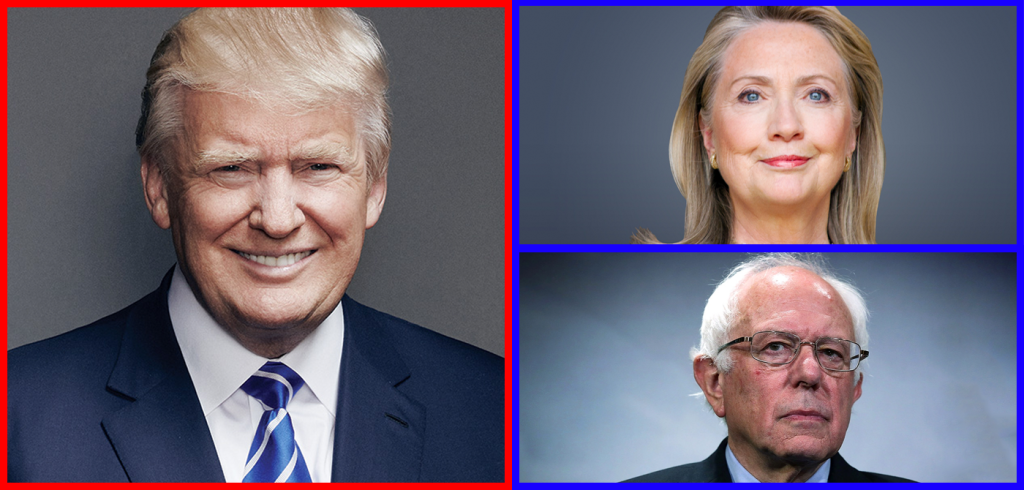
182 days until Election Day Convention Dates: Republican July 18-21 2016, Democratic July 25-28 2016 Weekly Headlines: John Kasich suspends campaign for President Ted Cruz suspends his campaign for President Donald Trump says wealthy may see tax increase Press Clips: The GOP’s 24 hour meltdown (Politico 5/8/16) Donald Trump on Tuesday night assumed the mantle of presumptive nominee and declared: “We want to bring unity to the Republican Party. We have to bring unity.” Three days later, the GOP is tearing itself apart. Friday brought another day of incredible division and revolt with Jeb Bush and Lindsey Graham falling in line not behind Trump, but behind House Speaker Paul Ryan, who said a day earlier that he cannot yet support the brash real estate mogul as his party’s standard-bearer. Trump, instead of trying to make peace, lashed out. He fired off a vicious statement, calling Graham an “embarrassment” with “zero credibility.” Then he laced into both of his former rivals during his rally in Omaha, Nebraska, where he is continuing to campaign ahead of Tuesday’s primary, despite having vanquished the rest of the GOP field. Donald Trump’s latest campaign shifts are not likely to be his last (LA Times 5/8/16) One of the top reasons voters have flocked to Donald Trump’s campaign has been because the tough-talking businessman “tells it like it is,” polls have shown. But what, exactly, Trump stands for has become a shifting picture of policies and proposals that even he acknowledged Sunday may not produce the promised outcomes. It’s not just that the billionaire’s ideas are vague by traditional political standards: bring back jobs, build a “beautiful” wall, “make America great again.” The political newcomer does not appear grounded in an ideology beyond assuring that America is “winning.” Hillary Clinton Says She Is Available for F.B.I. Interviews Over Emails (NY Times 5/8/16) Hillary Clinton said Sunday that the F.B.I. had not asked to interview her as part of its inquiry into her use of a personal email server as secretary of state. But Mrs. Clinton reiterated on CBS’s “Face the Nation” that she would make herself available to law enforcement officials as necessary. The investigation into Mrs. Clinton’s email practices and her handling of classified intelligence has shadowed her presidential campaign, and CNN reported last week that she was likely to be interviewed soon by the F.B.I. Mrs. Clinton said on Sunday that no meeting had been requested or scheduled. Trump: My tax plan is negotiable (Politico 5/8/16) Presumptive GOP presidential nominee Donald Trump said in an interview aired Sunday his tax plan was negotiable, explaining that taxes for the wealthy needed to “go up” — a stance that appears to contradict what’s in his plan. “For the wealthy, I think, frankly, it’s going to go up. And you know what, it really should go up,” Trump said on NBC News’ “Meet the Press.” His said his tax plan, which would lower tax rates for the wealthiest Americans, would be the opening bid of a negotiation with Congress and that his numbers were a “Floor.” Bernie Sanders rides ‘political revolution’ with thousands in N.J. (NJ.com 5/8/16) He’s down but not out, and his supporters are charged up. The math isn’t on U.S. Sen. Bernie Sanders’ side when it comes to securing the Democratic nomination, but thousands of eager supporters welcomed the underdog White House hopeful to New Jersey on Sunday and enthusiastically cheered on to “Light back and make a political revolution.” The cheers that filled the room and echoed off the walls of Rutgers University’s Louis Brown Athletic Center in Piscataway turned into roars of support when Sanders preached Lighting income inequality, the war or drugs and racial discrimination. “We have come a very long way in the past year,” Sanders said. “Real change is coming to America.” Nevada has option to vote ‘none of the above’ in 2016 presidential election (Las Vegas Now 5/4/16) The presidential race has narrowed and the only candidates still vying for the nomination are Hillary Clinton, Bernie Sanders and Donald Trump. Trump’s the only candidate in the race for the GOP, but for a lot of Republicans, he’s not their first choice. “I vehemently oppose our nominee in some of the comments and issues that he brought up during the campaign,” said U.S. Senator Dean Heller, R-NV. “Things he said about Muslims; issues he brought up about women and the Hispanic community — I just cannot agree with some of his positions, but I will tell you that I will not be voting for Hillary Clinton. I stated that early on, I will not be supporting a candidate that is nothing more than a third term of the Obama administration. So I will be looking else where in November.” Trump: I don’t know how people make it on $7.25 an hour (Politico 5/8/16) Donald Trump said in an interview aired Sunday he wants to see the minimum wage increased but would rather it be done by the states than the federal government. The presumptive GOP presidential nominee’s openness to increases in the minimum wage is a reversal from his previous stance that the minimum wage should not be raised, including when he famously pronounced during a debate last year that wages were “too high.”
Alabama legislative week in review: March 21 – March 25, 2016
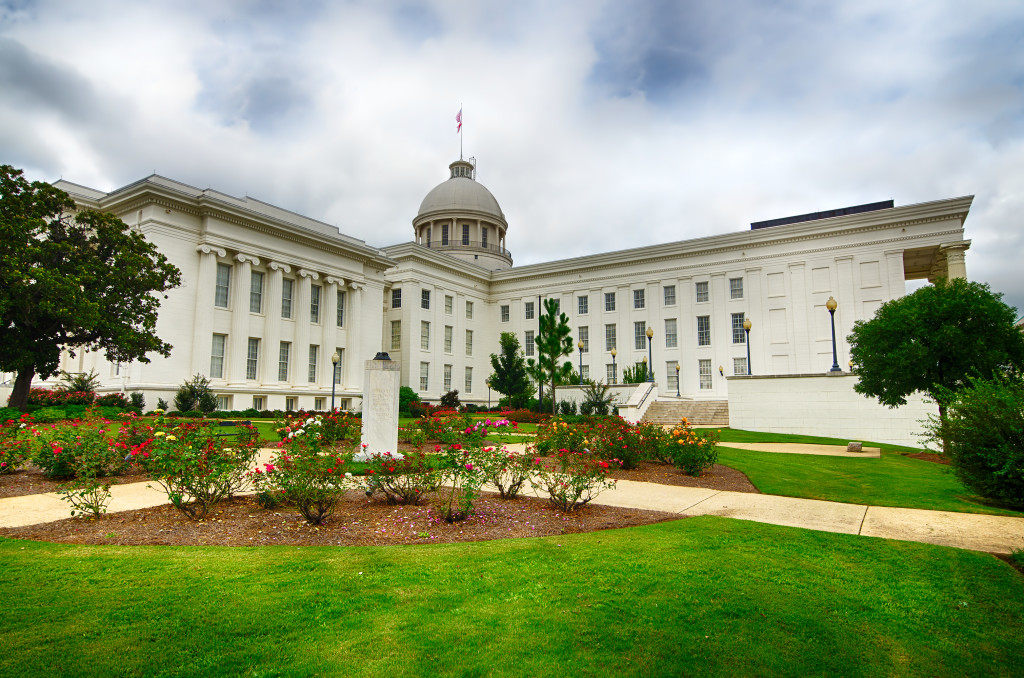
Legislators briefly passed through Montgomery this week with an eye toward their spring break, which began Thursday and won’t have them back in the statehouse until April 5. Despite only two legislative action days this week, both bodies took up high-profile legislation. Tuesday, the 17th day of the legislative session, got under way with the Alabama House of Representatives clearing the long-contested bill to provide a path to visitation rights for grandparents. HB334 from Rep. Mike Jones (R-Andalusia) passed with an affirmative vote from 97 lawmakers, though debate came over the fact that the bill may circumvent the will of fit parents to make decisions regarding the welfare of their children. Over in the Senate, lawmakers passed SB260 from Sen. Clay Scofield (R-Guntersville). The bill would bar the state from taking money from the state’s park system to prop up the General Fund. The practice is a legitimate concern, as lawmakers have taken $15 million from state park coffers over the past five years to deposit into the General Fund. The Senate also cleared HB34 from Rep. Mac McCutcheon (R-Capshaw). The bill, which was carried by Sen. Greg Reed (R-Jasper), provides tax breaks for state ports in an effort to remain competitive among states with similar incentives. Supporters say the move will attract large businesses and bring jobs to the state. The Senate continued on its roll Wednesday with the passage of SB205 from Sen. Paul Sanford (R-Huntsville), which would prohibit the location of abortion clinics within 2,000 feet of a school and bar the Alabama Department of Public Health from reissuing licenses to any clinic in violation of the new law. The Senate also approved a General Fund budget, which lacks sufficient funding for Medicaid, despite a veto threat from Gov. Robert Bentley. The Senate’s session came to a halt when it stalled a vote on Bentley’s landmark prison transformation bill. In committee hearings this week, the Mobile delegation declined a bill along party lines that would allow county residents to vote on whether or not to raise the local minimum wage to $10.10 an hour. A house committee approved a bill that will put to a vote the notion that a person is a person from the time of fertilization, effectively outlawing abortion in the state. A Senate committee took up a bill that would decriminalize possession of the epilepsy-relieving drug cannabidiol (CBD), but did not vote on the measure. It will likely come up for discussion again when legislators return from spring break April 5.
Mobile delegation opposes amendment to allow vote on minimum wage hike

The House Committee on Mobile County Legislation met Wednesday to discuss a slew of local legislation, including HB248 from Rep. Napoleon Bracy (D-Mobile). The constitutional amendment would allow Mobile citizens to vote on whether or not to raise the county’s minimum wage to $10.10 an hour. Bracy brought forth the bill in the form of a constitutional amendment in order to skirt around legislation passed earlier this session. HB174 from Rep. David Faulkner (R-Birmingham), also known as the Alabama Uniform Minimum Wage and Right to Work Act, was filed to thwart efforts by the Birmingham city council to gradually raise that city’s minimum wage to $10.10 an hour over three years. After being signed into law by Gov. Robert Bentley, the bill effectively bars in Alabama city or county from raising its minimum wage. If passed, the amendment would have been voted on by Mobile County voters in the upcoming November election. At the time of the committee’s vote Wednesday, eight committee members were present. The four representatives who voted against the bill, causing voting to end in a tie and causing the bill to gain an unfavorable report, were Reps. David Sessions (R-Mobile), Victor Gaston (R-Mobile), Margie Wilcox (R-Mobile) and Jack Williams (R-Mobile). The four Democrats on the committee voted in favor of the measure. Because of its failure to garner a favorable report in the committee hearing, the bill will not be heard by the full House of Representatives.
State Senate OKs minimum wage uniformity, blocks Birmingham increase

The Alabama State Legislature is pushing back against cities hoping to set their own minimum wage standards. Thursday, the Alabama Senate voted in favor of HB174 — also known as the Alabama Uniform Minimum Wage and Right to Work Act — a bill that would block cities from setting individual minimum wage rules. The Alabama House already approved the bill. The measure was approved by a 23-10 vote, mainly on party lines. “Senate Republicans deserve credit for championing and affirming that free enterprise creates opportunity for all,” said Sen. Jabo Waggoner (R-Vestavia Hills), a sponsor of the bill. “By passing the Alabama Uniform Minimum Wage and Right to Work Act, we are protecting job creators from having to deal with dozens of different minimum wages and labor rules that would vary from city to city.” The bill, which went directly to Gov. Robert Bentley for his signature, prevents local governments from instituting a minimum wage and requires all cities and counties in Alabama to use the federal wage standards as a measure. In addition, the legislation cements Alabama as a right-to-work state by giving the Legislature alone authority to establish uniform employment policies and regulations of collective bargaining. “We want businesses to expand and create more jobs – not cut entry-level jobs because a patchwork of local minimum wages causes operating costs to rise. Our actions today will create predictability and consistency for Alabama’s economy, which benefits everyone,” Waggoner said. The Senate’s action comes amid a battle between Birmingham and the Alabama Legislature over minimum wage standards. Birmingham City Council voted Tuesday to increase the city’s minimum wage to $10.10 an hour, effective the next day. In August, council originally had voted to begin the $10.10 minimum July 2017. Bentley signed the bill less than an hour after the vote, effectively blocking the Magic City’s efforts.
House Committee approves bill prohibiting cities from setting minimum wage

The House Committee on State Government met Thursday to discuss a bill from Rep. David Faulkner (R-Birmingham), HB174, also called the “Uniform Wage and Right-to-Work Act,” which will establish Alabama as a “Right-to-Work” state, prohibit local governments from establishing minimum leave, wages or other benefits for employees and would give the legislature authority to establish “uniform employment policies and regulations of collective bargaining under federal labor laws.” Faulkner noted that the bill has taken on unexpected importance due to Birmingham’s recent moves to increase its minimum wage to $8 an hour, with an eye for eventually increasing it to $10.10 per hour. “We all want jobs in this state,” Faulkner said. “We want this to be a business-friendly state climate. This bill does not set, it does not lower, it does not establish a minim wage. It says let’s maintain what we’ve always had in Alabama.” After Faulkner’s statements, a public hearing began with Michael Frank, member of the Brotherhood of Locomotive Engineers and Trainmen and the Teamsters Rail Conference. “I’ve tried to read this bill,” Frank said, condemning the short notice given on the public hearing for the bill. “It doesn’t make any sense to me. Business-friendly is great, but what are we trying to create here? Citizens haven’t had a chance to respond to this. Business has, obviously they crafted this bill.” Chris Stewart spoke in favor of the bill, noting that a minimum wage hike would stifle hiring and, in doing so, would disproportionately affect people with intellectual disabilities who would be forced to get back on an ID waiver, therefore taking money from the general fund. Ricky Kornegan, a retired coal miner and mayor of Woodstock, spoke in opposition of the bill on the grounds that the state government should not oversee the decisions of city governments, noting widespread opposition to the federal government’s interference in state government. Otis McGuire, a representative from Piggly Wiggly, who has seen the effect of Birmingham’s wage hike in stores in the area, spoke in favor of the bill. “With this type of move, it would negatively impact us,” McGuire said of Birmingham’s wage increase. “It’s not a real complicated issue to us, but it comes down to that thin, thin profit margin.” Next to speak in opposition of the bill was Joe Keffer, a member of grassroots organization “Montgomery Needs A Raise $10.10,” which advocated for the minimum wage increase in Birmingham. “What they’re doing is speaking for the businesses, for the wealthy, for the big corporations,” Keffer said. “It puts people in poverty.” Last to speak in support of the bill was Bill Canary of the Business Council of Alabama, who said the bill was an issue in support of small businesses. “Today the minimum wage has become a political wage issue of the worst type,” Canary said. “The best weapon in the war on poverty is jobs.” After the public hearing concluded, Rep. John Rogers (D-Birmingham) and Rep. Darrio Melton (D-Selma) offered opposition to the bill. “I’m a business man and I talk business and I’m a successful business man and I don’t pay a paltry salary,” Rogers said. “It’s a polarizing bill. Y’all know we’re going to be fighting this bill.” “Big business is making money, the people working these jobs are not making money,” Melton said. “It’s about how we treat our brothers and sisters.” A roll call vote was taken and the bill received a favorable report along party lines. If the bill passes the full Legislature, Birmingham’s minimum wage hike will revert back to the federal minimum wage.
Local “Fight for 15” campaign draws moderate turnout in Birmingham
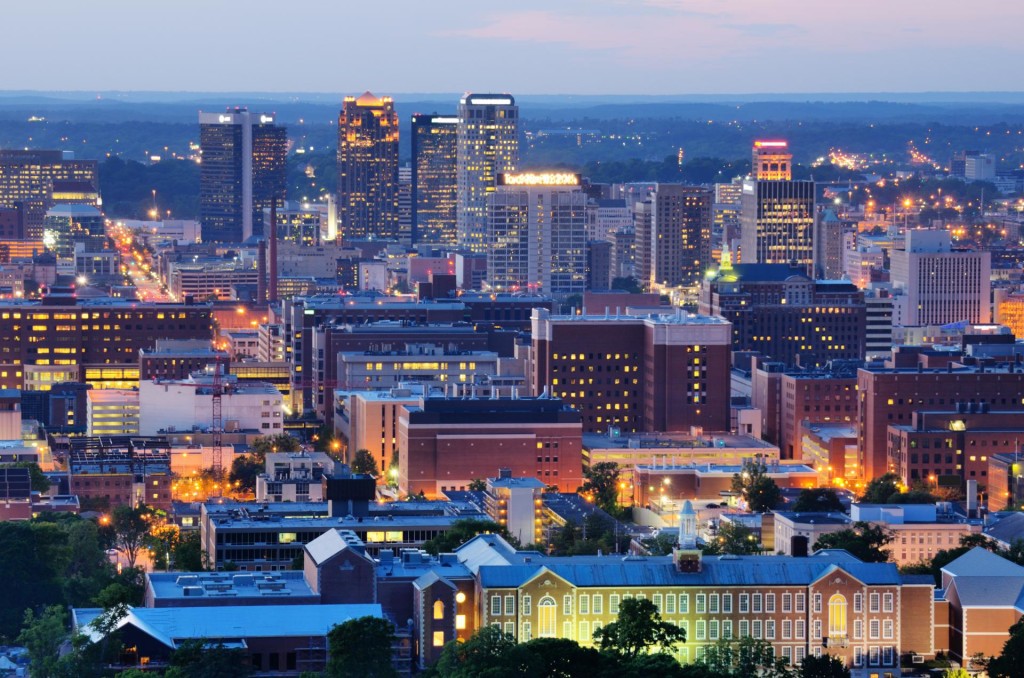
Across the nation, some 270 Occupy Wall Street-flavored campaigns urging statehouses, local governments and even Congress to increase the minimum wage to $15 an hour took place Tuesday. Democratic presidential candidate and Vermont Sen. Bernie Sanders even told protesters assembled outside the U.S. Capitol, “You’re having a profound impact.” But in downtown Birmingham? Not as much. According to reports, a crowd of around 30 gathered to stand in solidarity with labor and social justice activists around the nation calling for a higher minimum wage, including Pastor Gwendolyn Webb, a longtime leader of left-leaning movements dating back to the Civil Rights era. One protester called a $15 hourly wage “number where people can see a future,” where a normal worker can save and plan beyond the paycheck-to-paycheck grind. Protests also took place Tuesday night in Tuscaloosa, where they were joined by workers from the Hyundai plant in Selma. Don’t expect them to have the same kind of influence they had in New York for instance, where Gov. Mario Cuomo announced Tuesday he will pay all state workers in New York City $15 per hour, and all state workers that amount by 2021, however. Though Sanders joined in the call for “15 bucks and a union” Tuesday, Alabama is a famously supply-side state, and many blue-collar voters here seem to like that just fine. GOP leaders who routinely dominate the more labor-friendly Democrats at the ballot box say low taxes, low wages, and less regulation is what makes Alabama – which has had something of a manufacturing renaissance in recent years – competitive against its neighbors for jobs and development.
Alabama House delays bill to block cities from raising minimum wage

The Alabama House of Representatives has delayed a vote on a bill that would prohibit cities from raising the minimum wage. The proposal sparked heated debate Monday night on the House floor. Mountain Brook Republican Rep. David Faulkner says the state shouldn’t have a patchwork of minimum wages. He says he believes raising the minimum wage would cause businesses to move, close or not hire. The proposal sparked harsh criticism from Democrats. Rep. Chris England of Tuscaloosa says local governments can make the determination if a wage increase is needed in their areas. England argued that no one can live, or raise a family, on the current minimum wage of $7.25-an-hour. The bill was introduced after the Birmingham City Council voted to raise that city’s minimum wage to $10.10-per-hour. Republished with permission of the Associated Press.

